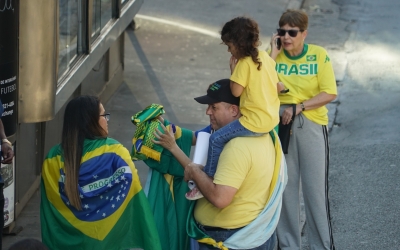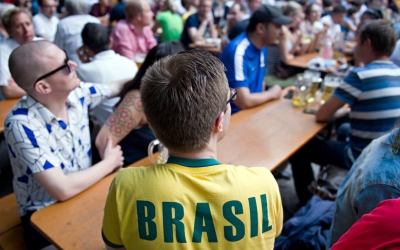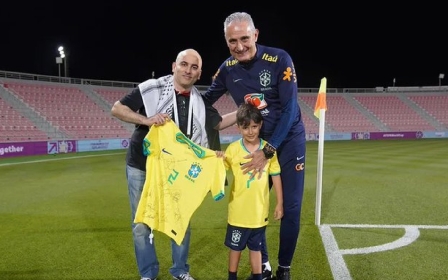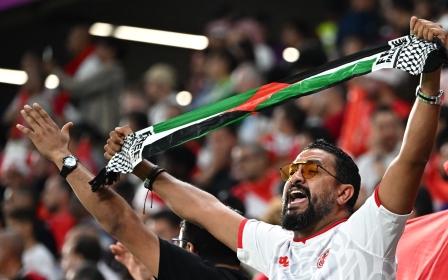World Cup 2022: Brazil's Syrian refugees rediscover love of the beautiful game
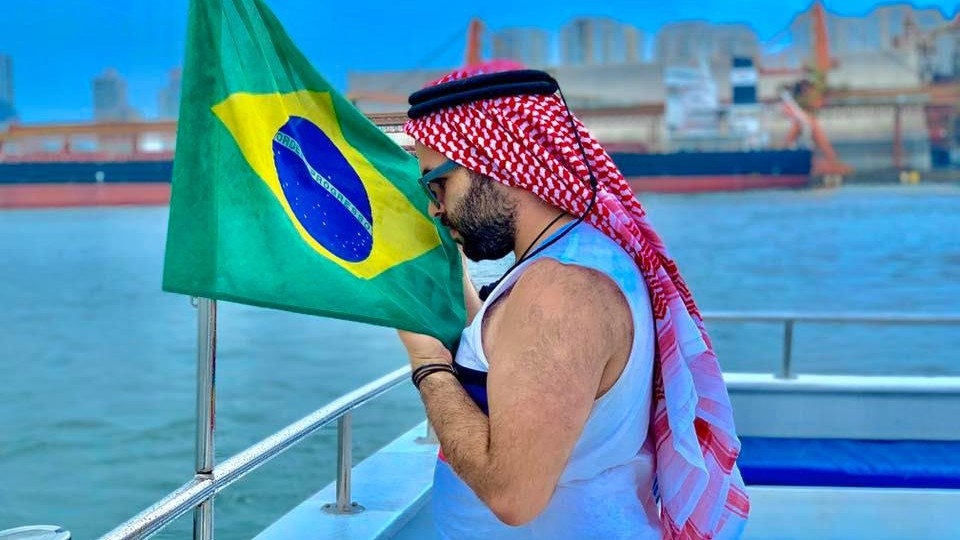
Like most who have fled conflict, Abdulbaset Jarour's path to asylum has not been easy.
Since the Syrian conflict erupted more than 10 years ago, more than five million Syrians have sought refuge in neighbouring Lebanon and Turkey in an attempt to escape the horrors of war.
But with refugee camps in those countries overflowing, and European nations setting a high bar for asylum seekers, Syrians such as Jarour have been forced to travel thousands of miles to seek refuge.
The 32-year-old and his family moved to Brazil in 2014 under the country's humanitarian visa programme, which offers those fleeing the Syrian conflict a chance to start over.
'There were pro- and anti-government people in our team... Both sides emigrated to save their lives... Football united us'
- Abdulbaset Jarour, Syrian refugee
Sao Paulo presents a host of challenges to refugees, not least of all unemployment, but Jarour has settled into this sprawling metropolis and his family now consider it their home.
New MEE newsletter: Jerusalem Dispatch
Sign up to get the latest insights and analysis on Israel-Palestine, alongside Turkey Unpacked and other MEE newsletters
He's found work, champions human rights and as an avid football fan, he's fallen in love with how the game is played here.
"Lebanon and Syria sent many immigrants to Brazil since the Ottoman Empire. That created connections - and football is a strong one," he said.
Since Brazil opened its doors to refugees in 2013, more than 2,500 Syrians have been granted refugee status - far more than in the US, according to Conare, Brazil's national refugee agency.
Most are clustered around Sao Paulo's main mosques in the Bras and Cambuci districts, where Arab restaurants, shisha cafes and supermarkets are easy to come by.
Still, while many refugees struggle to find work, football is increasingly being used as a distraction from the strains of life.
Bringing refugees together
Shortly after arriving in Sao Paulo, Jarour said he reached out to other recently resettled refugees and helped promote the first Refugees and Migrants Football Cup in an effort to bring the diaspora together.
"We used a universal language, football, to express ourselves and show to the people that we had to leave our countries but now we are Brazilians," he told MEE.
"There were pro- and anti-government people in our team," Jarour said. "Both sides emigrated to save their lives. When we began to train, an argument broke out. I told them that we were in Brazil now and that here we had to play in the same team. They understood the message. Football united us."
In the years that followed, the tournament was held in other Brazilian states and involved hundreds of players from several nationalities. The Syrian team reached the final on two occasions but narrowily missed out on glory each time.
Jarour said he's now working to establish what he calls "the world's first refugees and migrants football club", something he hopes to accomplish by the end of the year.
"It will be called Valentes Futebol Clube [Valiants Football Club]. It has already been registered with the Brazilian Football Confederation and will gather some of the Refugees' Cup participants," he said.
With Brazil gripped by World Cup fever, Jarour said he was overcome with emotion and reminded of his home city of Aleppo before the outbreak of war.
Balconies would be draped with Brazilian flags whenever the Selecao played, he told MEE.
He vividly remembers how Syrians would celebrate a Brazilian victory by carrying flags and other national symbols on their motorbikes.
"It looked like a [President Jair] Bolsonaro rally," he jokingly compared. Outgoing president Bolsonaro and his supporters have adopted the Brazilian flag and the national team jersey as their movement's symbol.
Sense of normality
For Fiton Assi, a 41-year-old Sao Paulo resident, football has instilled a sense of normalcy in her and her family's lives since they moved to Brazil in 2014.
Growing up in the Saudi port city of Jeddah, she said she would wake up at 3am to watch Brazil's matches in the 1994 World Cup.
"I loved to see Brazilian footballers like Romario play," she told MEE. That team broke a 24-year dry spell and made Brazil four-time world champions.
'Brazilian football has always been a symbol of joy in many Arab countries. It can create immediate empathy among people'
- Sheikh Jihad Hammadeh, Syrian-Brazilian
Assi would move to Damascus a few year later and remained in the country when the government of President Bashar al-Assad brutally cracked down on the Arab Spring protest movement. She fled in 2014.
"I couldn't bring my college diploma, so I am working in sales," she said. Her husband sells clothes, and to make extra money for her two daughters she sells Syrian craftwork.
According to Assi, football has gone from being a respite from the strains of poverty to a lifelong hobby.
Her daughters - aged 14 and 17 - play football at school and cheer for local clubs Corinthians and Sao Paulo. Assi, who used to be a goalkeeper at school in Saudi Arabia, cheers for Rio de Janeiro's Flamengo.
"This will be our third World Cup in Brazil. We are ready to watch all matches," she said.
'Symbol of joy'
Karlos Sakrog said he fell in love with Brazilian culture long before he fled to Brazil with his wife and two children in 2013.
Brazil is home to 15 million people of Arabic descent, including 3 million of Syrian heritage, and his home city of Homs is reported to have sent thousands of immigrants to Brazil in the first half of the 20th century.
"I have always loved Brazilian football and its great players, like Neymar," he told MEE.
His interest in the sport is not surprising.
In his younger years, Sakrog was a professional footballer and played for clubs in Syria, Libya, the UAE, and Russia. But since he injured his knee and fled to Syria the only job he could find was as a bricklayer.
Despite this, a game of kickabout is a welcome distraction.
"Two years ago, I studied to become a professional football manager. I have trained a few boys' teams, but now I am looking for a club where I can pursue my career," he said.
For many refugees, football is the only constant in their lives, Sheikh Jihad Hammadeh, who has lived in Brazil for decades, told MEE.
"Brazil is notorious for its football style in most Arab countries. Through the joyful style of Brazilian football, many Arabs discovered cultural similarities with Brazil," he said.
No matter where they've found themselves, football provides those who have been displaced a sense of belonging and, in many cases, a much-needed dose of normality, Hammadeh said.
"They [refugees] have been making a great effort to be successful in Brazil. Brazilian football has always been a symbol of joy in many Arab countries. It can create immediate empathy among people," he added.
Middle East Eye delivers independent and unrivalled coverage and analysis of the Middle East, North Africa and beyond. To learn more about republishing this content and the associated fees, please fill out this form. More about MEE can be found here.


